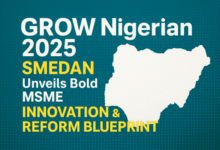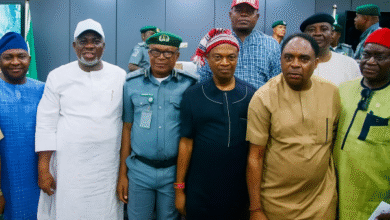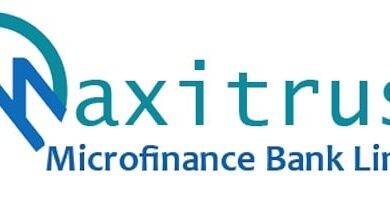IMF Endorses CBN’s Reforms as Nigeria’s Economic Reset Gains Global Recognition

:
International Monetary Fund hails Nigeria’s monetary policy overhaul, FX market reforms, and banking recapitalisation as catalysts for economic stability and investor confidence
In a rare vote of confidence from the International Monetary Fund (IMF), the Central Bank of Nigeria (CBN) has received global acclaim for bold monetary reforms that are steadily steering the nation back onto the path of macroeconomic stability. The endorsement came in the IMF’s 2025 Article IV Consultation Report on Nigeria, which lauds the sweeping changes under the leadership of CBN Governor, Olayemi Cardoso.
The IMF’s assessment is a significant validation of Nigeria’s reform agenda — one that has aimed to reset years of fiscal and monetary policy distortions, restore institutional independence at the apex bank, and build the foundations of a resilient financial system fit for inclusive, long-term growth.
Monetary Policy Reset: CBN Tightens the Belt
The IMF praised the Federal Government for implementing politically difficult — but necessary — economic decisions that are now yielding visible dividends. A central plank of this reset is the CBN’s return to operational independence after years of monetary-fiscal policy entanglement, particularly the overreliance on the controversial Ways and Means facility for budgetary financing.
According to the report, this fiscal discipline and the CBN’s unwavering commitment to price stability have begun to tame inflation. Headline inflation, which had soared to over 40%, fell to 22.9% by May 2025 — a significant, if hard-won, achievement. The IMF noted that the current tight monetary stance must be sustained until disinflation is firmly entrenched.
Foreign Exchange Reform: A Naira Revival
Nigeria’s embattled foreign exchange regime has also seen a dramatic turnaround. The Fund credited the CBN’s unified exchange rate framework and market-driven interventions with restoring confidence and transparency in FX markets. The results speak for themselves:
- FX inflows hit $6.9 billion in Q1 2025
- External reserves surged to $40.9 billion by end-2024 — equivalent to over eight months of import cover
- Exchange rate premium (the gap between official and parallel market rates) collapsed from over 60% to below 3%
These reforms have reinvigorated portfolio investment, strengthened the Naira, and laid a strong foundation for exchange rate stability.
Banking Sector: Capitalising for the Future
Beyond FX and inflation management, the IMF praised the CBN’s strategic focus on deepening financial system resilience. In particular, the ongoing banking sector recapitalisation — slated to conclude by March 2026 — is expected to significantly boost banks’ minimum capital and improve their shock-absorption capacity.
The Cardoso-led CBN is also working to expand financial inclusion, enhance consumer credit structures, and support capital market development. The Fund stressed the importance of risk-based supervision — especially for emerging sectors like fintech, mortgage lending, and crypto assets — to safeguard the financial ecosystem.
Building a Clean and Competitive Economy
Another noteworthy mention in the IMF report was Nigeria’s progress in combating money laundering and terrorism financing. The country is taking steps to strengthen its anti-money laundering (AML) and counter-terrorism financing (CFT) frameworks — a crucial move as it works to exit the Financial Action Task Force (FATF) grey list and unlock more global investment flows.
Risks Remain, But So Does Momentum
Despite the optimism, the IMF cautioned against complacency. Key downside risks include:
- Volatile global oil prices
- Rising international financing costs
- Geopolitical tensions and domestic security challenges
These factors could weigh on growth, fiscal sustainability, and currency stability. However, the CBN’s reform-minded strategy and renewed discipline offer a strong buffer.
CBN Reacts: ‘Staying the Course’
Reacting to the IMF’s findings, CBN Governor Olayemi Cardoso said the endorsement reflects the early success of Nigeria’s policy recalibration:
“At a time of global uncertainty, this assessment reaffirms that responsible, forward-looking policy choices matter.
It affirms that Nigeria is regaining credibility, anchoring expectations, and laying the foundation for inclusive, long-term growth.”
He added, “It is both an encouragement to stay the course and a reminder that resilience and prosperity require continued discipline and vision.”
Bottom Line: Global Confidence Restored, Now Execution Is Key
The IMF’s nod signals that Nigeria is regaining the trust of global stakeholders — but sustaining the gains will require continuous implementation of reforms, fiscal prudence, institutional coordination, and effective communication with domestic and international markets.
As BRANDECONOMY has long advocated, credibility in macroeconomic management is not built overnight — it is earned through consistent, transparent, and forward-looking policies. The path may remain narrow and rough, but Nigeria appears to have rediscovered its compass.











